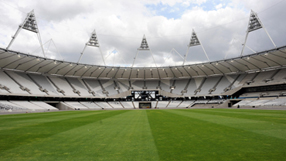West Ham to move to Olympic Stadium
West Ham United will move into the Olympic Stadium from 2016 thanks to a deal on Friday that makes the venue a lasting part of London's sporting scene but drew criticism over the cost to taxpayers.

The agreement should settle a long-running saga over the future of the stadium, built with 430 million pounds of public money and the centrepiece of last summer's London Games.
However, any triumphalism was tempered by criticism after local and national government pledged an additional 65 million pounds to help transform the venue into a 54,000-seater stadium for the Premier League club.
Leyton Orient, a local third tier club who fear the move by West Ham could put them out of business, are also pursuing a legal challenge to the decision.
"Through this deal with West Ham United FC, we are defying the gloomsters who predicted this landmark would become a dusty relic," said London mayor Boris Johnson.
West Ham, who have won the English FA Cup three times, have signed a 99-year agreement that will make them the main tenant of the stadium in East London, only around three miles from the smaller Boleyn Ground where they have placed for more than a century.
Johnson said conversion work could possibly be staggered to allow the stadium to host rugby World Cup matches before West Ham move in.
"We are looking with great interest at the rugby World Cup in 2015. It would be great if we could make that work," he told a news conference in a restaurant opposite the empty stadium.
Get FourFourTwo Newsletter
The best features, fun and footballing quizzes, straight to your inbox every week.
West Ham plan to add a new roof to keep fans dry during the winter, executive boxes and retractable seating to go over the running track to let supporters get close to the action.
The running track will remain and the stadium will host the 2017 world athletics championships.
FUNDING ROW
Finding a tenant who can regularly draw big crowds to a once forgotten corner of East London was seen as vital to ensuring the area gets lasting benefits from the billions of pounds invested in it before the Games.
One of the stumbling blocks between West Ham and the London Legacy Development Corporation (LLDC), the public body responsible for the stadium, was the division of conversion costs that have been estimated at up to 150 million pounds.
West Ham will contribute 15 million pounds towards the rebuilding work plus a share of naming rights income. The local council is providing 40 million pounds as a loan, while central government has offered up to 25 million pounds.
Former sports minister Richard Caborn called the West Ham deal "the biggest mistake of the Olympics."
"West Ham are basically getting a stadium costing more than 600 million pounds for just 15 million and a small amount in annual rent," he told British media.
Johnson defended the deal, saying it was a good investment for the taxpayer.
"It will deliver long-term revenues, and it will also help to regenerate part of east London and create thousands and thousands of jobs," he said.
The LLDC has also ensured that the taxpayer benefits from any increase in value of the club if owners David Gold and David Sullivan were to decide to sell it within the next 10 years.
